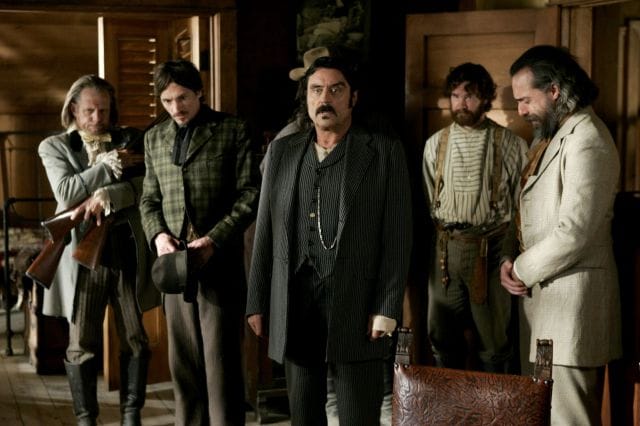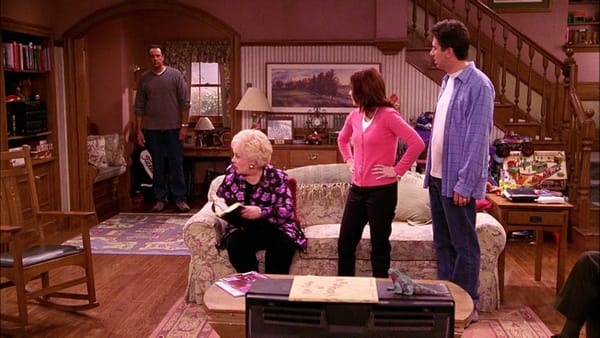Episodes: HBO's trilogy of America


The Sopranos, The Wire, and Deadwood aren't just three of the best TV series of all time. They also, weirdly, tell the entire story of America, in HBO-friendly terms.
(Let us pause, briefly, here to say that the continued downgrading of Deadwood in SOME CORNERS is just awful, regardless of whether it had a "planned ending" or not. For one thing, the show's finale works beautifully as a wrapup to the series. For another, there has never been another series like it, and it stands alone in the great TV canon. The things that make it great are stunning and singular, and I'm tired of it being knocked for not dragging out another season or two. IT IS THE BEST TV SHOW EVER MADE, THAT IS ALL.)
Ahem.
I have often wrestled with how to suggest prospective viewers take in these shows. For a long time, I recommended chronological order, which builds from the series that has the most in common with TV of the pre-antihero era (right down to its episodic structure) to the series that feels the most like something that rose up out of some TV primordial soup to stand on its own. This even extends to Six Feet Under, should you want to stick that in the middle there. You don't just see some great TV; you see TV start to figure out that it didn't have to be indebted to any art form but itself. (I actually wouldn't mind watching all of these episodes in the order they actually aired, and maybe tossing a few seasons of Big Love into the mix. An experiment for another time!)
But now, I increasingly suggest people should watch in chronological order of setting. That gives you this:
Deadwood: The birth of America: Yeah, this series takes place around 100 years after the founding of the American republic, but it's about how that rough, ruddy America turned into the modern country we live in today. It's a show about how individualists band together to form a society, when the incentive is right, and it's a show about how the democratic experiment needs a blank canvas upon which it can thrive. It is, in other words, about beginnings, and it's the best place to start.
(If you wanted to watch Six Feet Under, a show I have never wholly embraced but understand has many fans, I would insert it right here. We'll talk more about it in a bit.)
The Sopranos: The decline of America: Okay, so if we have this grand democratic experiment, why does it so often feel like it's breaking apart? The Sopranos attempts to tackle this question by focusing on the way that comfort and laziness break the bonds of society the characters in Deadwood formed. Democracy can only function with an engaged citizenry, and people like Tony Soprano are slowly slouching their way back toward that sense of everybody as an individual, not a collective. It's a chilly view of the world, but it serves as a great bridge between the two shows.
The Wire: The death of America: Intriguingly, this show also posits immense connections between people who might never meet each other, which gives this whole trilogy a bit of a mirroring effect. But if Deadwood is about the idea that everybody has to be a part of the democratic experiment or it will fail, The Wire is about how often people get left behind and how easy it is to court that failure. The Wire doesn't actually depict, like, the catastrophic failure of the American government, but it suggests a downward spiral that is leading somewhere. It's the flip side of Deadwood.
HBO, of course, wasn't consciously trying to do this. They had little to no control over what their three Davids (Chase, Simon, and Milch) were going to say in their shows. But the three men were obviously concerned with the same ideas and notions about their country, which gives this loose trilogy a surprisingly cohesive feeling. If you're looking for some good TV to watch, I highly recommend giving the above a shot.
(A brief note on Six Feet Under: I sometimes recommend placing this between Deadwood and The Sopranos as "the life of America," particularly if viewers really want to check out the show. I've always found it a little strained and turgid, especially in its later seasons. But if you're really interested in it, it fits nicely with all of the above. That said, I think it and the first three seasons of The Sopranos repeat each other a bit for purposes of this experiment, which is why I rarely suggest it without the viewer saying they really want to watch it.)
This out of the way, I will continue to work on my "America regards itself" decology of series about each decade of the 20th century. We're not all of the way there yet, but we're getting close. In the meantime, happy watching.
--
Episodes is published daily, Monday through Friday, unless I don't feel like it. It is mostly about television, except when it's not. Suggest topics for future installments via email or on Twitter. Read more of my work at Vox Dot Com.




